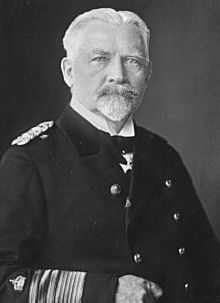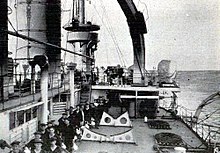Ludwig von Schröder
August Ludwig Schröder , von Schröder since 1912 , (* July 17, 1854 in Gut Hintzenkamp near Eggesin ; † July 23, 1933 in Berlin-Halensee ) was a German admiral and commanding admiral of the Marine Corps Flanders during the First World War .
Life
Ludwig Schröder was born on July 17, 1854 at Gut Hintzenkamp near Ueckermünde in Pomerania and raised in the Protestant faith. His father Karl Schröder, the landowner, died on December 24, 1891. His mother Albertine Schröder, née Gaude, outlived her husband by more than eight years. August Ludwig Schröder was the fourth of five siblings.
In 1860 Ludwig began school, initially with private tutors, and a short time later at a primary school in nearby Eggesin. In 1864 he switched to the Friedrich Wilhelm Realschule. In addition, he again received private lessons. He finished school in 1871.
On October 25, 1881 Ludwig married his wife Anna, née Lemcke, the daughter of a reindeer in Stettin . The couple had five children. After 43 years of marriage, his wife died nine years before him on November 3, 1924 in Berlin .
In the spring of 1871 Ludwig was registered as a cadet in the newly formed Imperial Navy with the necessary papers . After a few voluntary repetition hours, in May of the same year the summons to take the exam in Kiel was issued. After passing the exam without any problems, the direct draft order for military service came on May 31. His swearing-in took place on June 7th, with the lieutenant of the sea from Buchholz, on board the old barracks ship SMS Barbarossa in Kiel. On the same day he came to the sailing training ship SMS Niobe for eight months . He was then trained on the steam and sailing ship SMS Gazelle and on other ships before completing the naval school from October 1874 to September 1875 . After its completion, Schröder came to the 1st Sailor Division as a company officer, was then transferred to the tank frigate SMS Deutschland for three months and then to the SMS Kronprinz on August 22, 1876 , where he served as adjutant and signal officer. In the further course of his naval career he served on various ships, including as commander of the Aviso SMS Blitz , the training ship SMS Moltke and the large cruiser SMS Vineta . He was also chief of the cruiser division on the West Indian station . From October 1, 1907 to September 24, 1910, Schröder was chief of the Second Squadron of the High Seas Fleet . He was then appointed chief of the Baltic Naval Station and then promoted to admiral on January 27, 1911. On May 6, 1912, he was put to the disposition , while at the same time position à la suite of the marine officer corps .
Wilhelm II raised Schröder to the hereditary Prussian nobility on February 17, 1912 .
With the beginning of the First World War , Schröder was reactivated and on August 23, 1914 appointed commander of the Marine Division . On November 15, 1914 he was appointed Commanding Admiral of the newly formed Marine Corps Flanders . He also acted as commander of the coastal batteries ( Weserforts Brinkamahof ) of the 3rd sailor artillery department located near Bremerhaven . Not only were the naval forces in Flanders subordinate to him , but the entire marine infantry . These forces were involved in fierce fighting in Flanders in 1914 and took until 1918 on all four Flanders battles part. Due to his determined leadership in the sometimes extremely bloody battles, Ludwig von Schröder became known as the "Lion of Flanders". In 1921 he donated the Flanders Cross for the former members of this troop .

On the orders of the emperor he was to take action against the mutinous sailors in Kiel. Although the Reich government under Chancellor Max von Baden was against it, these plans were pursued further and the naval leadership was again against the government. The fact that the plans ultimately did not materialize "was solely due to the fact that the necessary troops were not available". Schröder commanded the corps until the end of the war until December 12, 1918 and was then finally retired.
In the post-war period, Belgium requested his extradition. Schröder was first chairman of the National Association of German Officers (NVDO) in the 1920s .
He was buried in the Berlin Invalidenfriedhof . His son was the future general of the flak cartillery and military commander of Serbia Ludwig von Schröder .
Honors
-
Pour le Mérite with oak leaves
- Pour le Mérite on October 20, 1915
- Oak leaves on December 23, 1917
- Order of the Red Eagle 1st class with oak leaves
- Order of the Crown, 1st class
- Grand Cross of the Bavarian Order of Military Merit with Swords
- Grand Cross of the Order of Albrecht with a gold star and swords
- Grand Cross of the Order of the Württemberg Crown with Swords
- 1917 honorary citizen of the city of Ueckermünde
- 1933–1947 Admiral von Schröder Strasse, opposite the former Reichsmarineamt in Berlin-Tiergarten , today named after the revolting sailor Albin Köbis .
- In honor of his former superior and fortress commander of the Weserforts Brinkamahof, senior ex-vice admiral Ludwig von Schröder, the composer Theodor Ludwig Karl Krieghoff published the Brummer March for piano / salon orchestra / wind music around 1919 .
literature
- Hanns Möller: History of the knights of the order »pour le mérite« in the world war. Volume II: M-Z. Verlag Bernard & Graefe, Berlin 1935, pp. 298-300.
- Dermot Bradley (eds.), Hans H. Hildebrand, Ernest Henriot: Germany's Admirals 1849-1945. The military careers of naval, engineering, medical, weapons and administrative officers with admiral rank. Volume 3: P-Z. Biblio Publishing House. Osnabrück 1990. ISBN 3-7648-1700-3 . Pp. 268-270.
- Hugo von Waldeyer-Hartz : "A man" - The life of Admiral Ludwig von Schröder . Vieweg, Braunschweig 1934, 291 pages, illustrations on 11 plates. Linen binding with silver embossed coat of arms. [Reprint planned, publication date 2034. - Cf. ISBN 978-3-322-96137-2 ]
- Karlheinz M. Reichert: Navy on the Lower Weser. Nordwestdeutsche Verlagsgesellschaft, Bremerhaven 1990, ISBN 3-927857-21-1 , pp. 70-78.
Web links
- Literature about Ludwig von Schröder in the state bibliography MV
- Newspaper article about Ludwig von Schröder in the 20th century press kit of the ZBW - Leibniz Information Center for Economics .
Individual evidence
- ↑ Dermot Bradley (ed.), Hans H. Hildebrand, Ernest Henriot: Deutschlands Admirale 1849-1945. The military careers of naval, engineering, medical, weapons and administrative officers with admiral rank. Volume 3: P-Z. Biblio Publishing House. Osnabrück 1990. ISBN 3-7648-1700-3 . P. 268.
- ↑ Johan Ryheul: Naval Corps from 1914 to 1918. Verlag Mittler & Sohn GmbH, Hamburg 1997, ISBN 3-8132-0541-X , p. 26.
- ^ Karlheinz M. Reichert: Navy on the Lower Weser. Nordwestdeutsche Verlagsgesellschaft, Bremerhaven 1990, ISBN 3-927857-21-1 , p. 72.
- ^ Dirk Dähnhardt : Revolution in Kiel. Neumünster 1978, p. 107.
- ↑ a b Brummer March by Th. Krieghoff on YouTube , accessed on February 7, 2017
- ↑ a b c d e f Ranking list of the Imperial German Navy , Ed .: Marinekabinett . Ernst Siegfried Mittler and son. Berlin 1918. p. 5.
- ^ Admiral-von-Schröder-Strasse . In: Street name lexicon of the Luisenstädtischer Bildungsverein
| personal data | |
|---|---|
| SURNAME | Schröder, Ludwig von |
| ALTERNATIVE NAMES | Schröder, August Ludwig von (full name); Schroeder, Ludwig von |
| BRIEF DESCRIPTION | German admiral |
| DATE OF BIRTH | July 17, 1854 |
| PLACE OF BIRTH | Hintzenkamp near Eggesin |
| DATE OF DEATH | July 23, 1933 |
| Place of death | Berlin-Halensee |



